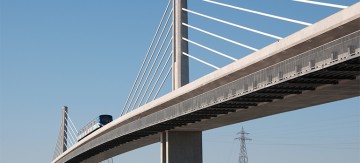The fourth and final OGI report on the 2010 Winter Games has been released.
University of British Columbia research into the long-term impact of hosting the 2010 Winter Olympic and Paralympic Games found that residents who live in or around Vancouver and Whistler are enjoying improved transit infrastructure and access to athletic facilities.
“This explains why cities aggressively pursue the opportunity to host these large-scale events,” said Rob VanWynsberghe, a professor in UBC’s Faculty of Education, who conducted this research through UBC’s Centre for Sport and Sustainability, a centre formed in 2010 to study how sport transforms cultures and communities.
Well before the Olympic bid, regional and provincial governments knew that funding was needed for three major infrastructure projects: the Sea-to-Sky Highway upgrade, the Canada Line light rapid transit extension to Vancouver International Airport, and a major expansion to the Vancouver Convention Centre. The Olympics offered an unparalleled opportunity to gain federal and provincial collaboration and support.
According to the report, for every $12 spent by the province and Ottawa for the Sea-to-Sky Highway, Canada Line, and the Convention Centre, taxpayers only put $1 toward this infrastructure.
“Residents paid little in direct taxes to get great infrastructure,” said VanWynsberghe. “If you use transit, ski or work in tourism, it is a good deal.”
Local residents may have enjoyed the greatest benefits in capital infrastructure but VanWynsberghe says that hosting a successful Games also boosted pride and nationalism across the country. He calls this spillover, the “red mitten effect.”
“These red mittens have been used to raise money for athletes of all levels in every part of Canada,” he said. “There is something in Canadian nationalism, pride and identity that was strengthened by the 2010 Olympics.”
To view a full copy of the OGI report, click here
Above text from UBC Public Affairs, to view the full UBC Press Release, click here
